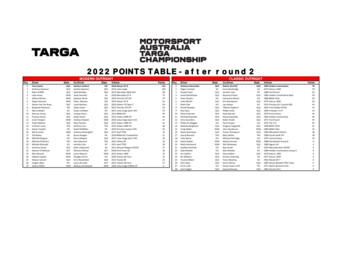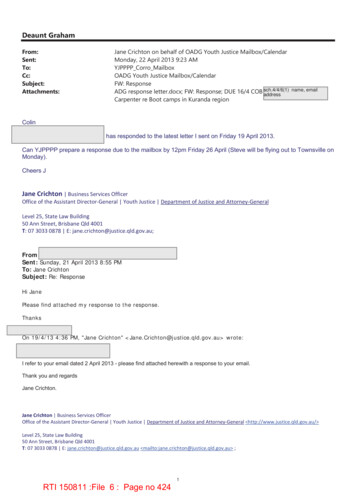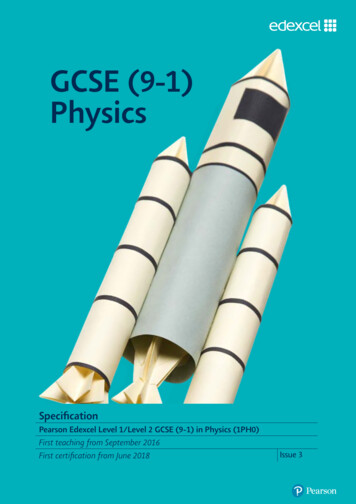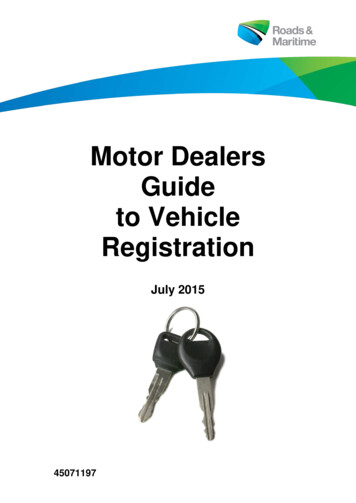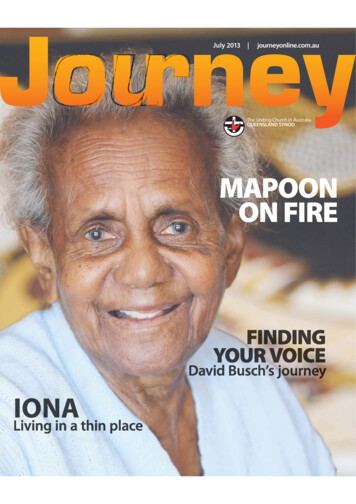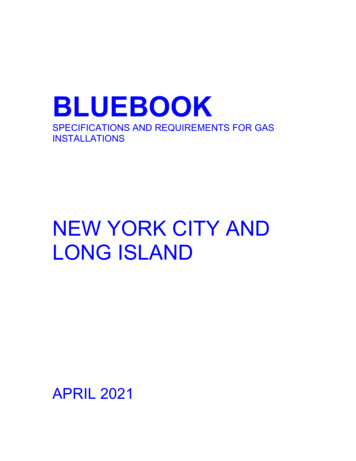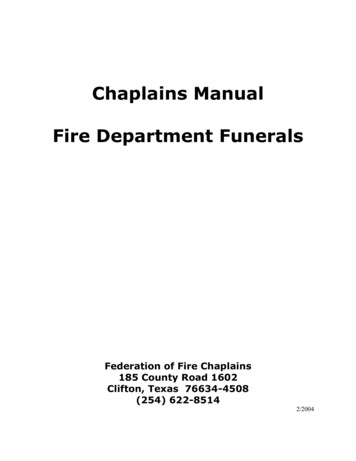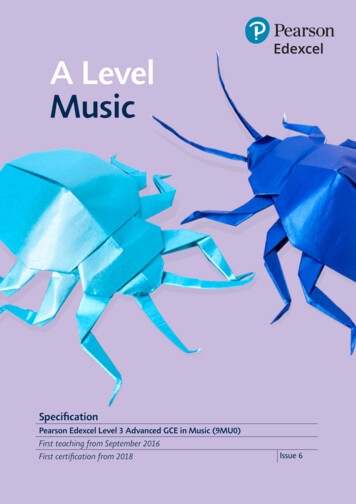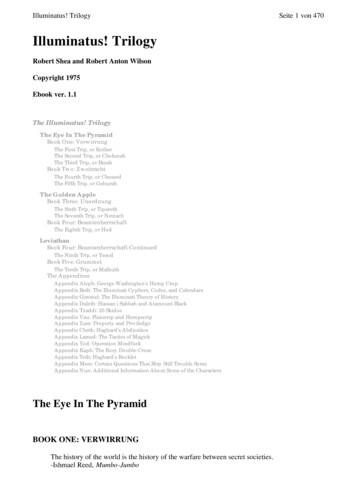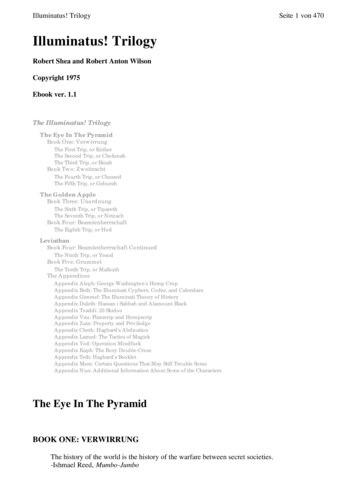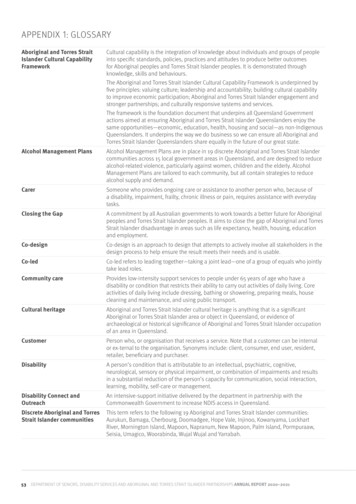
Transcription
APPENDIX 1: GLOSSARYAboriginal and Torres StraitIslander Cultural CapabilityFrameworkCultural capability is the integration of knowledge about individuals and groups of peopleinto specifc standards, policies, practices and attitudes to produce better outcomesfor Aboriginal peoples and Torres Strait Islander peoples. It is demonstrated throughknowledge, skills and behaviours.The Aboriginal and Torres Strait Islander Cultural Capability Framework is underpinned byfve principles: valuing culture; leadership and accountability; building cultural capabilityto improve economic participation; Aboriginal and Torres Strait Islander engagement andstronger partnerships; and culturally responsive systems and services.The framework is the foundation document that underpins all Queensland Governmentactions aimed at ensuring Aboriginal and Torres Strait Islander Queenslanders enjoy thesame opportunities—economic, education, health, housing and social—as non-IndigenousQueenslanders. It underpins the way we do business so we can ensure all Aboriginal andTorres Strait Islander Queenslanders share equally in the future of our great state.Alcohol Management PlansAlcohol Management Plans are in place in 19 discrete Aboriginal and Torres Strait Islandercommunities across 15 local government areas in Queensland, and are designed to reducealcohol-related violence, particularly against women, children and the elderly. AlcoholManagement Plans are tailored to each community, but all contain strategies to reducealcohol supply and demand.CarerSomeone who provides ongoing care or assistance to another person who, because ofa disability, impairment, frailty, chronic illness or pain, requires assistance with everydaytasks.Closing the GapA commitment by all Australian governments to work towards a better future for Aboriginalpeoples and Torres Strait Islander peoples. It aims to close the gap of Aboriginal and TorresStrait Islander disadvantage in areas such as life expectancy, health, housing, educationand employment.Co-designCo-design is an approach to design that attempts to actively involve all stakeholders in thedesign process to help ensure the result meets their needs and is usable.Co-ledCo-led refers to leading together—taking a joint lead—one of a group of equals who jointlytake lead roles.Community careProvides low-intensity support services to people under 65 years of age who have adisability or condition that restricts their ability to carry out activities of daily living. Coreactivities of daily living include dressing, bathing or showering, preparing meals, housecleaning and maintenance, and using public transport.Cultural heritageAboriginal and Torres Strait Islander cultural heritage is anything that is a signifcantAboriginal or Torres Strait Islander area or object in Queensland, or evidence ofarchaeological or historical signifcance of Aboriginal and Torres Strait Islander occupationof an area in Queensland.CustomerPerson who, or organisation that receives a service. Note that a customer can be internalor ex-ternal to the organisation. Synonyms include: client, consumer, end user, resident,retailer, benefciary and purchaser.DisabilityA person’s condition that is attributable to an intellectual, psychiatric, cognitive,neurological, sensory or physical impairment, or combination of impairments and resultsin a substantial reduction of the person’s capacity for communication, social interaction,learning, mobility, self-care or management.Disability Connect andOutreachAn intensive-support initiative delivered by the department in partnership with theCommonwealth Government to increase NDIS access in Queensland.Discrete Aboriginal and TorresStrait Islander communitiesThis term refers to the following 19 Aboriginal and Torres Strait Islander communities:Aurukun, Bamaga, Cherbourg, Doomadgee, Hope Vale, Injinoo, Kowanyama, LockhartRiver, Mornington Island, Mapoon, Napranum, New Mapoon, Palm Island, Pormpuraaw,Seisia, Umagico, Woorabinda, Wujal Wujal and Yarrabah.53DEPARTMENT OF SENIORS, DISABILITY SERVICES AND ABORIGINAL AND TORRES STRAIT ISLANDER PARTNERSHIPS ANNUAL REPORT 2020–2021
Family ResponsibilitiesCommissionThe Family Responsibilities Commission is a statutory body, established under theQueensland Family Responsibilities Commission Act 2008 to support the establishment oflocal Aboriginal and Torres Strait Islander authority and the restoration of social norms inthe Welfare Reform communities of Aurukun, Coen, Doomadgee, Hope Vale and MossmanGorge.Full-time equivalentFull-time equivalent is calculated by the number of hours worked in a period divided bythe award full-time hours prescribed by the award/industrial instrument for the person’sposition. For example, a person working 20 hours per week in a position prescribed as40 hours has a full-time equivalent of 0.5. An organisation’s full-time equivalent is the sumof all full-time equivalents. Minimum Obligatory Human Resources Information businessrequirements mean that this period is the last full fortnight of a quarter.GovernanceThe framework of rules, relationships, systems and processes within, and by which,authority is exercised and controlled within organisations. It encompasses the mechanismsby which organisations, and those in authority, are held to account.Human Services QualityFrameworkA system for assessing and improving the quality of human services that applies toorganisations delivering services under a service agreement with the department or otherspecifed arrangements.Land Holding Act ProjectHistorical Land Holding Act (LHA) 1985 – refers to the original 1985 LHA legislation underwhich leases were approved or granted. This legislation was amended in 2013, see theAboriginal and Torres Strait Islander Land Holding Act 2013 ce/2013-09-23/act-2013-002)Benefciary assessments – refers to the identifcation of benefciaries for deceased estatesthat include LHA leases or lease entitlements, most commonly completed under Section60 of the Aboriginal and Torres Strait Islander Communities (Justice, Land and OtherMatters) Act 1984 ce/2019-10-09/act1984-051). The average number of individuals consulted per benefciary assessment isseven.Engagement – refers to consultation undertaken with leaseholders, lease entitlementholders, or their identifed benefciaries to provide information and assist decision-makingin relation to the available home qwnership options and associated responsibilities. Thisincludes providing information about the option to surrender or transfer a lease.Local Thriving CommunitiesLocal Thriving Communities is a signifcant, long-term reform that will result in a visiblydiferent way of government working with communities to deliver better outcomes for thestate’s remote and discrete Aboriginal and Torres Strait Islander communities.National Aborigines andIslanders Day ObservanceCommittee (NAIDOC) WeekNAIDOC Week is recognised nationwide in the frst full week of July. It is a time tocelebrate Aboriginal and Torres Strait Islander cultures, and an opportunity to recognisethe contributions that Aboriginal peoples and Torres Strait Islander peoples make to ourcountry and our society.National Disability InsuranceAgencyThe National Disability Insurance Agency (NDIA) is an independent statutory agency whoserole is to implement the National Disability Insurance Scheme (NDIS), which support abetter life for Australians with a signifcant and permanent disability and their families andcarers.National Disability InsuranceSchemeThe National Disability Insurance Scheme (NDIS) is an Australian Government scheme thatsupports people with permanent and signifcant disability, and their families and carers.The NDIS provides reasonable and necessary supports to people to live an ordinary life.National partnershipagreementsNational partnership agreements are agreements between the Commonwealth of Australiaand state and territory governments. The agreements include objectives, outcomes, outputs and performance indicators, and roles and responsibilities that will guide the deliveryof services across relevant sectors.APPENDICES0707 APPENDICES 54
Native TitleNative Title is the recognition by Australian law that some Aboriginal peoples and TorresStrait Islander peoples have rights to their lands and territories that derive from traditionallaws and customs.Path to TreatyPath to Treaty represents a once-in-a-generation opportunity to come together asQueenslanders to start a journey towards a future that is more just, equal and respectfulfor First Nations Queenslanders.Permanent separation rateSeparation rate is calculated by dividing the number of permanent employees whoseparated during a period of time by the number of permanent employees in theorganisation.Planning schemesPlanning schemes provide Aboriginal councils and Torres Strait Island councils withinformation to underpin decisions about the sustainable use of the community’s land.Remote and discrete Aboriginal This term refers to the following 34 Aboriginal and Torres Strait Islander communities:and Torres Strait IslanderAurukun, Bamaga, Cherbourg, Doomadgee, Hope Vale, Injinoo, Kowanyama, LockhartcommunitiesRiver, Mapoon, Mornington Island, Napranum, New Mapoon, Palm Island, Pormpuraaw,Seisia, Umagico, Woorabinda, Wujal Wujal, Yarrabah, and the Torres Strait islands ofBadu, Boigu, Dauan, Erub (Darnley), Hammond, Iama (Yam), Kubin (Moa), Mabuiag, Mer(Murray), Poruma (Coconut), Saibai, St Pauls (Moa), Ugar (Stephens), Warraber and Yorke.In some instances, this also includes the communities of Laura, Mossman Gorge, Coen andTorres Shire (Thursday Island, Ngarupai (Horn Island) and Prince of Wales).Remote Indigenous Land andInfrastructure Program Ofce(RILIPO)Established in July 2009 to coordinate whole-of-government funded works and addresscomplex tenure and land administration issues in the 34 remote and discrete Aboriginaland Torres Strait Islander communities in Queensland. RILIPO works in partnershipwith Traditional Owners, community leaders, the three tiers of government and keystakeholders to achieve social and economic outcomes for remote and discrete Aboriginalpeoples and Torres Strait Islander peoples. RILIPO combines a collaborative approachand extensive expertise across a range of program areas to help communities to resolvecomplex land administration issues including Native Title; land tenure; survey, townplanning and infrastructure development; and providing opportunities for home ownershipand economic development.Respite servicesServices that provide short-term, temporary relief to those who are caring for familymembers who might otherwise require permanent placement in a facility outside thehome.Restrictive practicesInterventions such as: containment or seclusion; chemical restraint; mechanical restraintand physical restraint; or restricting access (for example, to objects by locking cupboards).These practices are required for adults with intellectual or cognitive disability who exhibitbehaviour that places themselves or others at risk of harm.Targeted Aboriginal and Torres The term ‘targeted communities’ is used throughout the report in relation to theStrait Islander communitiesService Delivery Statement performance measure–number of houses made availablefor ownership by Aboriginal peoples and Torres Strait Islander peoples in targetedcommunities through Queensland Government investment.These communities include: Aurukun, Cherbourg, Woorabinda, Doomadgee, Hope Vale,Kowanyama, Lockhart River, Mapoon, Mornington Island, Napranum, Northern PeninsulaArea (5 communities), Palm Island, Pormpuraaw, Yarrabah, Wujal Wujal, Torres StraitIslands (15 islands), Coen and Mossman Gorge.Tracks to TreatyTracks to Treaty is a Queensland Government agenda focussed on reframing therelationship with Aboriginal and Torres Strait Islander Queenslanders. The QueenslandGovernment is committed to a new way of working, delivering change and outcomesthrough a genuine partnership approach. Tracks to Treaty incorporates both Path to Treatyand Local Thriving Communities.Welfare ReformWelfare Reform is a partnership between the Queensland Government, the AustralianGovernment, the Cape York Institute and the communities of Aurukun, Coen, Doomadgee,Hope Vale and Mossman Gorge.55DEPARTMENT OF SENIORS, DISABILITY SERVICES AND ABORIGINAL AND TORRES STRAIT ISLANDER PARTNERSHIPS ANNUAL REPORT 2020–2021
APPENDIX 2: OUR LEGISLATIONThe functions and powers of the Department of Seniors, Disability Services and Aboriginal and Torres Strait IslanderPartnerships are derived from administering the following Acts of Parliament, in accordance with AdministrativeArrangements Order (No.2) 2020.ACTSTATUTORY OBJECTIVEAboriginal and Torres Strait IslanderCommunities (Justice, Land andOther Matters) Act 1984(except to the extent administered bythe Deputy Premier and Minister forState Development, Infrastructure,Local Government and Planning; andthe Attorney-General and Minister forJustice, Minister for Women and Ministerfor the Prevention of Domestic andFamily Violence); (sections 4, 8, 64-67,70 and 71 jointly administered withthe Attorney-General and Minister forJustice, Minister for Women and Ministerfor the Prevention of Domestic andFamily Violence)This Act regulates a number of issues impacting on Aboriginal and Torres StraitIslander communities, including: the establishment of Community Justice Groups,the establishment of Community Police Ofcers, entry to trust areas, and alcoholpossession and consumption in community areas.Aboriginal Cultural Heritage Act 2003The main purpose of this Act is to provide efective recognition, protection andconservation of Aboriginal cultural heritage.Torres Strait Islander Cultural Heritage The main purpose of this Act is to provide efective recognition, protection andAct 2003conservation of Torres Strait Islander cultural heritage.Family Responsibilities CommissionAct 2008The objectives of this Act are to: support the restoration of socially responsible standards of behaviour and localauthority in Welfare Reform community areas help people in Welfare Reform community areas to resume primary responsibilityfor the wellbeing of their community and the individuals and families of thecommunity.The objectives are achieved primarily through the operation of the FamilyResponsibilities Commission.Meriba Omasker Kaziw Kazipa (TorresStrait Islander Traditional ChildRearing Practice) Act 2020The purpose of this Act is to: recognise Ailan Kastom child rearing practice establish a process for making applications for, and decisions about, the legalrecognition of the practice.Carers (Recognition) Act 2008The objects of this Act are to: recognise the valuable contribution by carers to the people they care for recognise the beneft, including the social and economic beneft, provided bycarers to the community provide for the interests of carers to be considered in decisions about theprovision of services that impact on the role of carers establish the Carers Advisory Council.07 APPENDICES 56
ACTSTATUTORY OBJECTIVEDisability Services Act 2006The objects of this Act are to: acknowledge the rights of people with disability including by promoting theirinclusion in the life of the community generally ensure that disability services funded by the department are safe, accountableand respond to the needs of people with disability support the operation of the NDIS in Queensland and ensure the quality andsafety of NDIS supports or services in the context of the national regulatoryframework safeguard the rights of adults with an intellectual or cognitive disability includingby regulating the use of restrictive practices by relevant service providers inrelation to those adults:› only where it is necessary to protect a person from harm› with the aim of reducing or eliminating the need for use of the restrictivepractices.Forensic Disability Act 2011The purpose of this Act is to provide for the involuntary detention, and the care,support and protection, of forensic disability clients, while at the same time: safeguarding rights and freedoms balancing rights and freedoms with the rights and freedoms of other people promoting individual development and enhancing opportunities for quality of life maximising opportunities for reintegration into the community.Guide, Hearing and Assistance DogsAct 2009The objects of this Act are to: assist people with a disability who rely on guide, hearing or assistance dogs tohave independent access to the community ensure the quality and accountability of guide, hearing and assistance dogtraining services.57DEPARTMENT OF SENIORS, DISABILITY SERVICES AND ABORIGINAL AND TORRES STRAIT ISLANDER PARTNERSHIPS ANNUAL REPORT 2020–2021
APPENDIX 3: DEPARTMENT BOARDS AND COMMITTEESBOARD OF MANAGEMENTPurposeTo shape the strategic direction of the department to ensure the delivery of the government’spriorities; monitor performance against the department’s strategic objectives; and ensurestrategic partnerships are established and maintained.Membership Meeting frequencyThe Board of Managment (BOM) meets monthly. The BOM has met fve times from 13 November2020 to 30 June 2021.Director-General (Chair)Associate Director-General, Seniors and Disability ServicesDeputy Director-General, Policy and Corporate ServicesDeputy Director-General, Culture and Economic PolicyAssistant Director-General, Disability Connect QueenslandAssistant Director-General, Disability Accommodation, Respite and Forensic ServicesChief Human Resource OfcerChief Finance OfcerDirector, Ofce of the Director-General (non-voting member).AS&RS SENIOR LEADERSHIP TEAM COMMITTEEPurposeTo set the strategic direction for Accommodation Support and Respite Services (AS&RS);monitor strategic and operational activities; and respond strategically to emerging issues.Membership Meeting frequencyThe AS&RS Senior Leadership Team Committee meets monthly. The Committee met six timesfrom 13 November 2020 to 30 June 2021.Assistant Director-General, Disability Accommodation, Respite and Forensic Services (Chair)AS&RS DirectorsManagers, Service Area and Service Support (Afernoon Session)Principal Executive Ofcer to Assistant Director-GeneralManager, Business Services.AUDIT AND RISK COMMITTEEPurposeTo provide independent assurance and assistance to the Director-General on: the risk, control and compliance frameworks, and the department’s external accountabilityresponsibilities, and other matters relevant to the duties and responsibilities of thecommittee as set out below, and as prescribed in the:› Financial Accountability Act 2009› the Financial Accountability Regulation 2009› the Financial and Performance Management Standard 2009.Membership Meeting frequencyThe Audit and Risk Committee meets quarterly each fnancial year. The Committee met twotimes from 13 November 2020 to 30 June 2021.Chair, External Independent MemberExternal Independent MemberAssociate Director-General, Seniors and Disability ServicesDeputy Director-General, Policy and Corporate ServicesDeputy Director-General, Culture and Economic PolicyEmerging Leader (member) – currently vacant.07 APPENDICES 58
FINANCE COMMITTEEPurposeTo provide expert fnancial and budget advice to enable the Director-General, as theAccountable Ofcer, to discharge the position’s legislated fnancial managementresponsibilities.Membership Director-General (Chair) Associate Director-General, Seniors and Disability Services Deputy Director-General, Policy and Corporate Services Deputy Director-General, Culture and Economic Participation Assistant Director-General, Disability Connect Queensland Assistant Director-General, Disability Accommodation, Respite and Forensic Services Executive Director, Infrastructure and Coordination Chief Human Resource OfcerPositions Reporting to the Committee Chief Finance Ofcer Director, Financial Management.Meeting frequencyThe Finance Committee meets monthly. The Committee met four times from 13 November 2020to 30 June 2021.FRAUD AND CORRUPTION CONTROL SUB-COMMITTEEPurposeTo oversee the department’s fraud and corruption prevention programs, and monitor theefectiveness of internal controls and compliance.Membership Meeting frequencyThe Fraud and Corruption Control Sub-Committee meets quarterly. The Committee met oncefrom 13 November 2020 to 30 June 2021 due to the changes in the membership of the SubCommittee as a direct result of the Machinery of Government and the availability of themembers to convene for meeting during this period.59Chief Finance Ofcer (Chair)Deputy Director-General, Policy and Corporate ServicesExecutive Director, Culture and Economic ParticipationDirector, Accommodation Services and Respite Services Service SupportDirector, Property and ProcurementDirector, Royal CommissionDirector, FinanceManager, Ethical StandardsManager, Governance, Planning and ReportingDirector, Information Policy, Security and Engagement (Department of Children, YouthJustice and Multicultural Afairs) (under the MOU agreement).DEPARTMENT OF SENIORS, DISABILITY SERVICES AND ABORIGINAL AND TORRES STRAIT ISLANDER PARTNERSHIPS ANNUAL REPORT 2020–2021
INFORMATION STEERING COMMITTEEPurposeTo provide strategic direction on information management to the department and ensure theinvestments in new information management and ICT projects are aligned with departmentaland Whole of Government priorities.Membership Deputy Director-General, Policy and Corporate Services (Chair) Deputy Director-General, Culture and Economic Participation Assistant Director-General, Disability and Seniors Connect Executive Director, Strategic Policy and Legislation, Seniors and Disability Services Chief Finance Ofcer.Non-Voting Members Queensland Government CISO, Queensland Government Customer and Digital Group,Department of Communities, Housing and Digital Economy Deputy Director-General, CIO, Corporate Services, DCYJMA Chief Human Resource Ofcer Secretariat: Manager, ICT Director, Internal Audit Director, Policy, Security and Engagement Information Services (MOU CYJMA).Meeting frequencyThe Information Steering Committee meets bi-monthly. The Committee met during thereporting period to allow for the fnalisation of a memorandum of understanding for thedelivery of corporate services including information technology.PRIORITY PROJECTS OVERSIGHT GROUPPurposeTo provide oversight and strategic leadership of the implementation of priority projects (i.e.key time-limited initiatives) and oversight of key whole-of-government priorities.Membership Meeting frequencyDirector-General (special invitee)Associate Director-General, Seniors and Disability Services (Chair)Deputy Director-General, Culture and Economic ParticipationAssistant Director-General, Disability Connect QueenslandAssistant Director-General, Disability Accommodation, Respite and Forensic ServicesExecutive Director, Local Thriving CommunitiesExecutive Director, Strategic Policy and Legislation (Aboriginal and Torres Strait IslanderPartnerships)Executive Director, Strategic Policy and Legislation (Seniors and Disability Services)Chief Human Resource OfcerChief Finance OfcerDirector, Ofce of the Director-General.The Priority Projects Oversight Group meets monthly. The Group met three times between itsformation in February 2021 and to 30 June 2021.07 APPENDICES 60
REGIONAL SERVICE DELIVERY BOARDPurposeTo manage emerging business and operational issues that impact on regional service deliveryrelated to Aboriginal and Torres Strait Islander Queenslanders.Membership Deputy Director-General, Culture and Economic Participation (Chair) Deputy Director-General, Policy and Corporate Services Executive Director, Infrastructure and Coordination Director, Remote Indigenous Land andInfrastructure Program Ofce Regional Director, Cape and Torres Regional Director, Cairns and Hinterland Regional Director, North Queensland Regional Director, Central Queensland Regional Director, South East Queensland (North) Regional Director, South East Queensland (South) Regional Director, South West Queensland.Meeting frequencyThe Regional Service Delivery Board meets bi-monthly. The Board met four times from 13November 2020 to 30 June 2021.WORKFORCE CAPABILITY AND CULTURE STEERING COMMITTEEPurposeDrive the implementation of key workforce strategies to embed a culture that upholds theQPS and SOILD values; build workforce capability and re-silience to meet current and futureorganisational needs; and promote the highest standards of ethical behaviour.Membership Meeting frequencyThe Workforce Capability and Culture Steering Committee meets quarterly. The Committee mettwo times from 13 November 2020 to 30 June 2021.61Assistant Director-General, Disability and Seniors Connect (Chair)Chief Human Resources OfcerDeputy Director-General, Culture and Economic ParticipationAssistant Director-General, Disability Accommodation, Respite and Forensic ServicesDeputy Director-General, Policy and Corporate Services.DEPARTMENT OF SENIORS, DISABILITY SERVICES AND ABORIGINAL AND TORRES STRAIT ISLANDER PARTNERSHIPS ANNUAL REPORT 2020–2021
APPENDIX 4: SERVICE DELIVERY STATEMENTS2020–2021 Performance StatementDuring 2020–2021, the Department of Seniors, Disability Services and Aboriginal and Torres Strait Islander Partnershipsdelivered the following services:Seniors Services—developed programs and services for seniors that reduce the cost of living, enhance wellbeing,support community participation, and prevent and address elder abuse. Age-friendly communities assisted seniors tocontribute economically, socially and culturally to their communities.Disability Services—enabled people to access disability services that assist them with the core activities of daily livingand achieving their goals, as part of inclusive communities, and to contribute to systems that safeguard and protect therights of people with disability.Aboriginal and Torres Strait Islander Partnerships – Economic Participation—increased the economic participation ofAboriginal peoples and Torres Strait Islander peoples.Aboriginal and Torres Strait Islander Partnerships – Community Participation—increased the community participation ofAboriginal peoples and Torres Strait Islander peoples.Seniors servicesDEPARTMENT OF SENIORS, DISABILITY SERVICES ANDABORIGINAL AND TORRES STRAIT ISLANDER PARTNERSHIPSNOTES2020–2021TARGET/EST.1, 288%2020–2021ACTUAL(1 July 2020 to30 June 2021)SERVICE AREA: SENIORS SERVICES1Service standardsEfectiveness measurePercentage of eligible Seniors with a Seniors Card2Efciency measure388%3Notes1This service area was previously presented in the former Department of Communities, Disability Services and Seniors’ 2019–2020 Service Delivery Statement.2 This is a proxy measure of the efectiveness in promoting the Seniors Card scheme to applicable stakeholders and forms partof the cost of living strategy. The percentage of eligible seniors with a Seniors Card is calculated by the total number of activecardholders divided by the estimated resident population of seniors within Queensland. The estimated resident populationis sourced from the Australian Bureau of Statistics, Report 3101.0 Australian Demographic Statistics. Estimated ResidentPopulation by Single Year of Age, Queensland.3 An efciency measure is being developed and will be included in a future Service Delivery Statement.07 APPENDICES 62
Disability servicesDEPARTMENT OF SENIORS, DISABILITY SERVICES ANDABORIGINAL AND TORRES STRAIT ISLANDER T/EST.1, 2, 3882824480%77%(1 July 2020 to30 June 2021)SERVICE AREA: DISABILITY SERVICES1Service standardsEfectiveness measureNumber of people with disability receiving departmental accommodation andsupport services2Efciency measurePercentage of accomodation support places used3Notes1This service area was previously presented in the former Department of Communities, Disability Services and Seniors’ 2019–2020 Service Delivery Statement.2 People with disability exercise choice and control in receiving their accommodation support services from the department,a non-government organisation or a private organisation. This service standard records the annual number of peoplewith disability who have received accommodation support services provided by the department, including shared livingarrangements and short-term accommodation support or respite. This is a proxy measure of the efectiveness of thedepartment’s services in supporting safe and independent living.3 The variance between the 2020-2021 target/estimate and the 2020-2021 actual was due to clients’ ability to exercise choice andcontrol in selecting service providers, consistent with the principles of the NDIS. As the NDIS support market grows and there arenew services and new options, clients and clients’ families or guardians have more choice in who provides their supports andhow they access these supports.4 This utilisation measure records the number of people receiving accommodation support services as a proportion of thenumber of approved places, including shared living arrangements and short-term accommodation support (or respite).Usage rates below full capacity are required to enable people to trial and enter and exit accommodation places that arewell-maintained and re-equipped between usage to ensure the wellbeing of clients and staf. Rates below full capacity arealso expected as a) market growth in the number and range of supports is encouraged with the implementation of the NDISmeaning that, in particular, people may choose diferent types of services that provide a respite-type efect for carers (other thanshort-term accommodation support) and b) the department operates within the principle of competitive neutrality.63DEPARTMENT OF SENIORS, DISABILITY SERVICES AND ABORIGINAL AND TORRES STRAI
National Disability Insurance Agency . National Disability Insurance Scheme . The National Disability Insurance Agency (NDIA) is an independent statutory agency whose role is to implement the National Disability Insurance Scheme (NDIS), which support a better life for Australians with a signifcant and permanent disability and their families and .
